Call bets, also known as French bets, are a special category of wagers in roulette and are usually accepted at high-stakes tables in brick-and-mortar casinos. Players can make this type of wager simply by “calling” what they wish to bet rather than placing the chips on the table themselves. In fact, only croupiers are allowed to place the chips for call bets on the layout. This makes it easier for players to bet on more complex combinations of numbers.
Sometimes, call bets are accepted when there is a crowd surrounding the table – in such cases, some players have no other option but to call their bets because they cannot get close enough to the table to place the chips themselves.
Call bets are often mistaken for announced bets, yet there is a difference between the two. When players ‘call’ their bets, they do not actually have any chips on the layout. The croupier simply marks the bet on the table for them. However, in many gambling venues, especially those in the UK, call bets are prohibited because the practice is considered betting on credit.
Many land-based casinos, however, do accept announced bets. High-stakes players can still call or announce their bets as long as they have sufficient chips on the layout to cover their wagers. Call bets cover a series of numbers located in specific sections of the wheel. The name of each type of call bet is derived from the numbers’ positions on the spinning device.
Naturally, players have the chance to place these complex bets from the comfort of their homes, as many online casinos offer roulette variations in which call bets are available. Popular options include Common Draw Roulette by Microgaming’s Diamond Edition of Premier Roulette, and Playtech’s 3D Roulette, among many others.
Read on if you are interested in becoming more familiar with the types of call bets that can be placed in roulette.
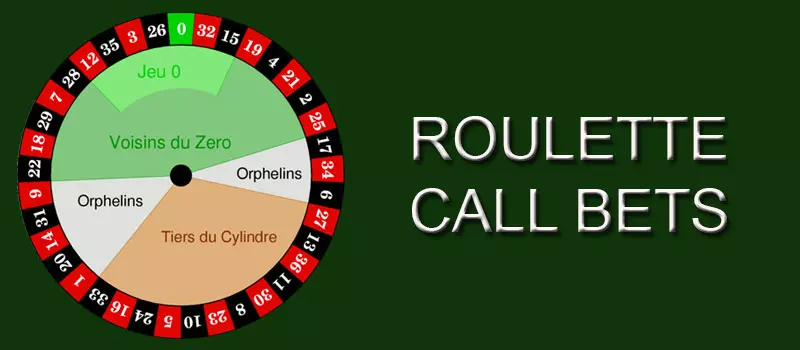
Les Voisins du Zéro or Neighbours of Zero
One of the most popular call bets is the so-called Les Voisins du Zéro, which translates as ‘Neighbours of Zero’. This call bet includes all 17 numbers that lie between 22 and 25 (inclusive) on the wheel. The numbers are as follows: 22, 18, 29, 7, 28, 12, 35, 3, 26, 0, 32, 15, 19, 4, 21, 2 and 25. Please note that this type of bet can be placed only in European roulette, since the numbers surrounding the zero on the American roulette wheel are arranged in a different sequence.
The Neighbours of Zero bet requires nine chips, which are placed on several splits. Five of the chips are placed on the splits 4-7, 12-15, 18-21, 19-22 and 32-35. Two chips are staked on the trio 0-2-3, and the other two are placed as a corner bet covering 25, 26, 28 and 29.
Naturally, while playing roulette over the Internet, gambling enthusiasts can easily opt for this wager type with just a single click on the area of the racetrack labelled ‘Voisins du Zéro’.
Another important thing roulette mavens should bear in mind is that if their call bet is settled as a win, the payout will be determined by the winning number. A payout of 17 to 1 is granted for the split numbers, 8 to 1 for the corner bet, and 11 to 1 for the combination of three numbers.
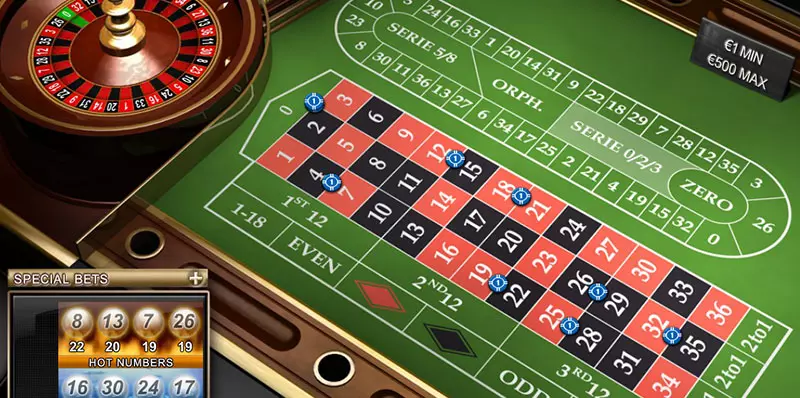
Odds and Probabilities
Low Limits Roulette
High Stakes Roulette
American Roulette
European Roulette
Jeu Zero or Zero Game
Interestingly enough, this call bet did not originate in France. Its origins can be traced back to German gambling venues, where it was referred to as Zero Spiel, or Zero Game. Jeu Zero bets cover only seven numbers – those that are located closest to the single-zero pocket on the wheel, including the zero itself. These are 12, 35, 3, 26, 0, 32 and 15. Of course, the Neighbours of Zero bet also covers these numbers, but in Jeu Zero, only four chips are required to place the bet. One chip is staked as a split bet on 0-3, another on the split 12-15, a third is placed on number 26 as a straight-up bet, and the last chip on the split 32-35.
The payout for winning Jeu Zero bets depends on the number on which the ball lands. If 26 comes up, players are paid 36 to 1, but if any of the remaining six numbers is spun, the payout will be 18 to 1.
This wager type is also popular among gambling enthusiasts as the five-piece bet, and players should know that there is a variation requiring one additional straight-up bet on 19.
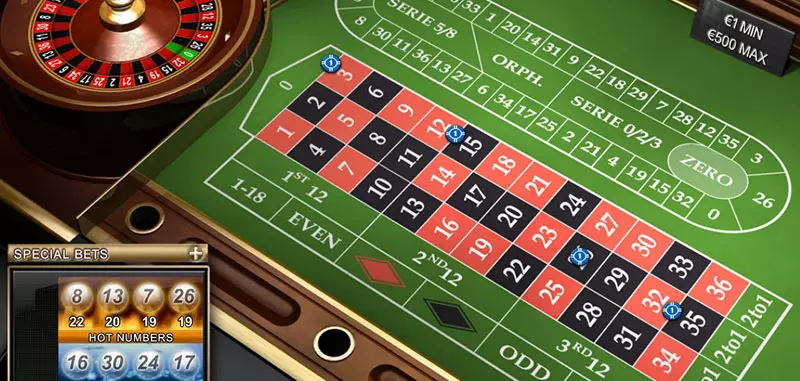
Les Finales or Final Bets
There are two variations of Final bets. The first is the so-called Finales en Plein, in which players bet on numbers ending with the same digit. An example would be a Finales en Plein bet on 0, 10, 20 and 30. It is important to mention that for numbers ending in 0, 1, 2, 3, 4, 5 and 6, four chips are used, while for numbers ending in 7, 8 and 9, the player needs three chips. This is so because only three numbers on the European roulette wheel end in 7, 8 or 9.
Finales à Cheval is another variation of Final bets, placed on splits of numbers ending with the same digit. For split bets on 0-1, 1-2, 2-3, 4-5 and 5-6, the player will need five chips. Split bets on 0-3, 1-4, 2-5, 3-6, 7-8 and 8-9 require four chips. Three chips are used for the pairs 4-7, 5-8, 6-9, 7-10, 8-11 and 9-12.
In some online roulette variations – Microgaming’s Premier Roulette, for example – players can place Finales Cheval Plein bets. This type of Final bet involves both split and straight-up bets. An example of Finales Cheval Plein would be a bet on 1-2 (split), 11-12 (split), straight-up bets on 21 and 22, and 31-32 (split). Combining split bets and straight-up bets is necessary here because of the design of the table layout; since 21 and 22 are not located next to each other, it is impossible to place a split bet on them.
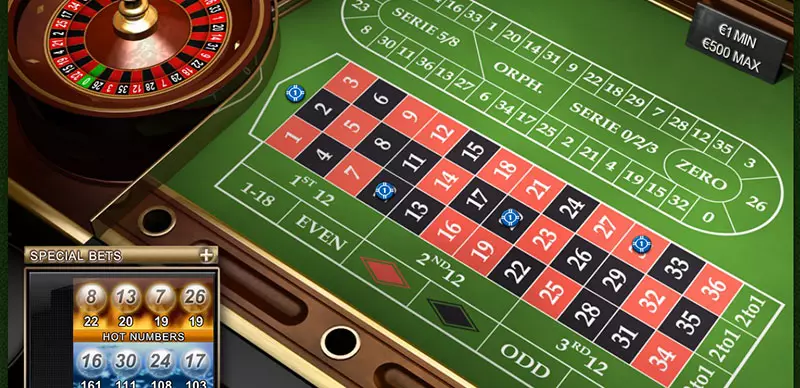
Tiers du Cylindre or Third of the Wheel
Tiers du Cylindre bets cover one-third of the wheel and are placed on 12 numbers located between 27 and 33. This section of the wheel includes the following sequence – 27, 13, 36, 11, 30, 8, 23, 10, 5, 24, 16 and 33.
The wager involves six chips, which are placed on the six splits 5-8, 10-11, 13-16, 23-24, 27-30 and 33-36. Winning Tiers du Cylindre bets pay 17 to 1.
Roulette lovers might come across another variant of this bet, known among players as Tier 5-8-10-11. What is specific about this variant of Tiers du Cylindre is that gambling enthusiasts need to make straight-up bets on 5, 8, 10 and 11, which means they are opting for a ten-piece roulette stake.
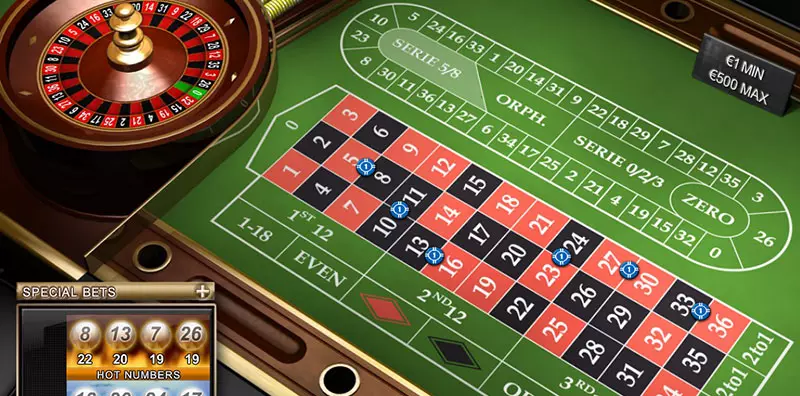
Les Orphelins or the Orphans
This type of bet covers the two remaining sections of the wheel outside the Tiers and Voisins and features a total of eight numbers. Three of the numbers (17, 34 and 6) are located to the right of the single-zero pocket, while the other five (1, 20, 14, 31 and 9) are positioned to the left of the zero.
The bet is placed with five chips. Four of the chips are staked on the splits 31-34, 17-20, 14-17 and 6-9, and the remaining chip is placed as a straight-up bet on number 1.
In terms of pay-offs, the straight-up bet pays 35 to 1, but if any of the other numbers wins, players will be paid 17 to 1, which is the standard payout for winning split bets.
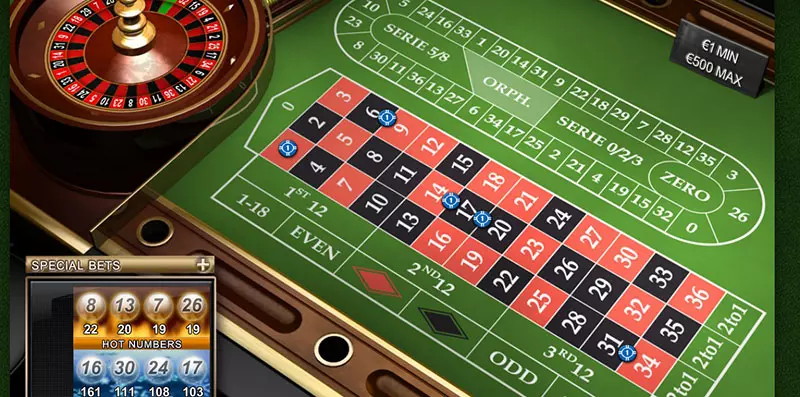
Neighbour Bets
The way in which this roulette wager functions is not as straightforward as the above-mentioned bets, which is why many players shy away from placing it. In most cases, such bets can be made only when the roulette variant selected by the player has a single 0 pocket.
Neighbour bets cover one number chosen by the player, together with the two numbers that lie to the left and right of that number on the wheel, which means that, ultimately, a total of five numbers will be covered.
Thus, if players pick 7, the other numbers incorporated into their Neighbour bet will be 12, 18, 28 and 29.
Neighbour bets that are settled as winning ones provide a pay-off of 35 to 1.
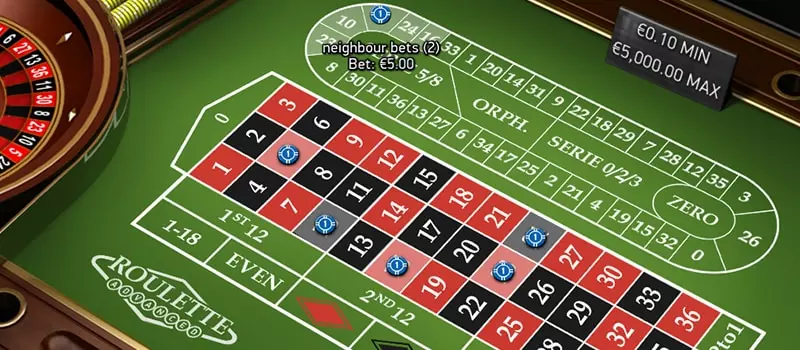
Full Complete or Maximum Bets
If you are a high-stakes roulette player, the Full Complete bet might appeal to you. This wager is particularly interesting because it incorporates all inside bets and places them on a single number.
If we assume that you want to make a Full Complete on 17, this will mean that you will make a straight-up bet, split bets on 17/14, 17/16, 17/18 and 17/20, a street bet that covers 17, 16 and 18, four corner bets, and two six-line bets.
Needless to say, the payoff for such a wager will be impressive, but players should bear in mind that, most of the time, the staked amount will reach the upper betting limit, which explains why it will not appeal to players on a budget.
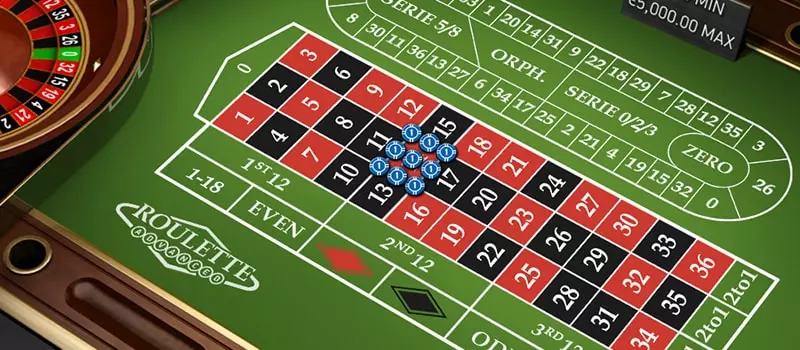
Red and Black Splits
The name of this call bet is fairly self-explanatory, as when players opt for it, they will cover all black or red splits. When the red splits are concerned, players will need four chips to cover 9-12, 16-19, 18-21 and 27-30. When going for the black splits, a total of seven chips will be needed to cover 8/11, 10/11, 10/13, 17/20, 26/29, 28/29 and 28/31. Regardless of the option chosen, the payoff provided will be 17 to 1.
Lucky Dip Bets
Those who enjoy playing the lottery have most probably heard of Lucky Dip, which is a participation in a lottery game with randomly selected numbers. Similarly, some online roulette variations also offer Lucky Dip call bets.
Following the same principle, this type of call bet chooses the numbers randomly rather than letting you decide on your own. As the name suggests, the entire betting decision is based on luck, as numbers are randomly chosen.
Some roulette versions offer this call bet under the name ‘Random 7′. Simply put, this feature enables players to place seven chips on random numbers on the roulette table grid. The seven chips are either placed as straight-up bets or as splits, with players often ending up betting on more than seven random numbers.
If you play roulette online, you may also come across several live-dealer variations by Playtech offering Lucky Dip call bets. Instead of placing seven random chips on the table, however, players will also have the chance to pick only five random positions or to opt for a riskier game and place eight random bets. In this variation of roulette, the random bets are placed only as straight-ups. As Lucky Dip call bets are typical straight-up or split bets, a correct guess will award the standard payout for a straight-up or split bet.
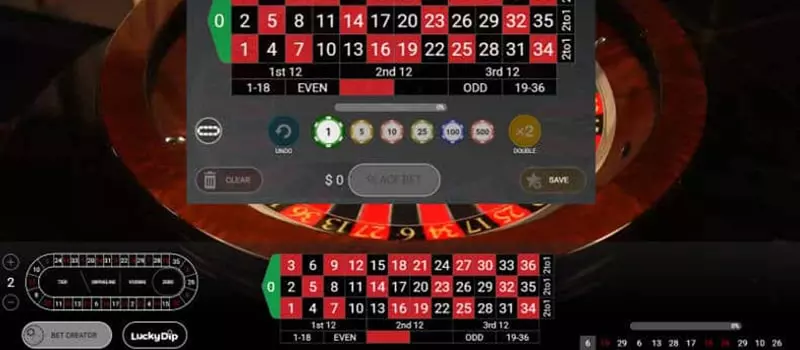
Fixed and Variable Roulette Call Bets
Something players need to take into account before placing call bets is that they can be either fixed or variable. When it comes to variable call bets, the numbers they cover are determined by the players’ preferences and therefore do not remain the same. Hence, examples of variable call bets would be Neighbours and Finals.
Fixed call bets, on the other hand, invariably cover the same numbers. Such bets include Voisins du Zero, Jeu Zero, Orphelins and Tiers du Cylindre.



